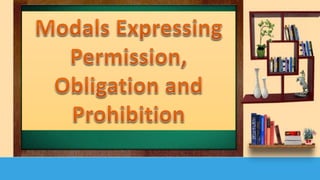Modals-PPT.pptx
- 1. PALAHANAN INTEGRATED NATIONAL HIGH SCHOOL Palahanan 2nd San Juan, Batangas TitserJuan
- 3. 1.Express permission, obligation, and prohibition through the use of modals 2. Identify the modals expressing permission, obligation and prohibition 3. Communicate more clearly and effectively through proper use of modals in the activities EN9G-IVd-23: Express permission, obligation, and prohibition
- 4. Form a word using the given numbers that corresponds to the letter in the alphabet. 1. 13 15 4 1 12 19 2. 16 5 18 13 9 19 19 9 15 14 3. 15 2 12 9 7 1 20 1 15 14 4. 14 5 3 5 19 19 9 20 25 5. 16 18 15 8 9 2 9 20 9 15 14
- 5. Directions: Construct a sentence using the words below. 1. MUST 2. HAVE TO 3. SHOULD 4. OUGHT TO 5. CAN
- 7. Two types of modal verbs of obligation Those that primarily express a firm obligation or necessity â must and have to And those that express a recommendation or moral obligation- should and ought to
- 9. Examples of firm obligation or necessity The costumers must have a library card to take out the book. You must stop when a traffic lights turn red. We have to obey the law.
- 10. Examples of recommendation or moral obligation 1. You should/ought to see a doctor. You look pale and weak. 2. As the president of the organization, he should/ought to finish these accomplishment reports. 3. You should/ought to revise your poem.
- 12. Can is another type of modal often used to ask for and give permission.
- 13. Both canât and mustnât are also modals used to show that something is prohibited â it is not allowed.
- 14. Canât tells us that something is against the rules. Mustnât is usually used when the obligation comes from the person who is speaking.
- 18. ACTIVITY Directions: Read the following sentences. Use the correct modals of prohibitions/permission in each of the sentences. 1. ______ I stay with the group? 2. You _______ park here, maâam. The parking lot is full. 3. You ______ wear shirts but you _____ wear jeans in the pool. 4. You _____ use Mandelaâs speech to inspire the youth. 5. You _______ make noise while the session is on going.
- 19. 6. Iâm afraid you_______ smoke here sir. Itâs dangerous for your health. 7. I canât get a connection on my phone. _____ I borrow yours? 8. Did they tell you that you _______ come to this area. Itâs restricted to staff only. 9. Thereâs a lot of noises coming from outside. _____ I close the window? 10. You _____go into that restaurant without a tie.
- 20. ACTIVITY Direction: Use must/have to, should/ought to correctly in the following sentences. 1. I _____ stay on for a few hours because Iâd rather work late today than over the weekend. 2. We ___________do a rehearsal before the final show. 3.Children______ go to school. 4. You ________ be careful in choosing your career path. 5. I _____save money for my future needs.
- 21. 6. We _______find courage even in the small things that we do. 7. You ______ follow the rules of the University. 8. Robert ______ revise his composition. 9. My doctor said that I ________stop smoking or Iâll have serious health problems. 10. We ______ be at the airport at least two hours before our flight.






















